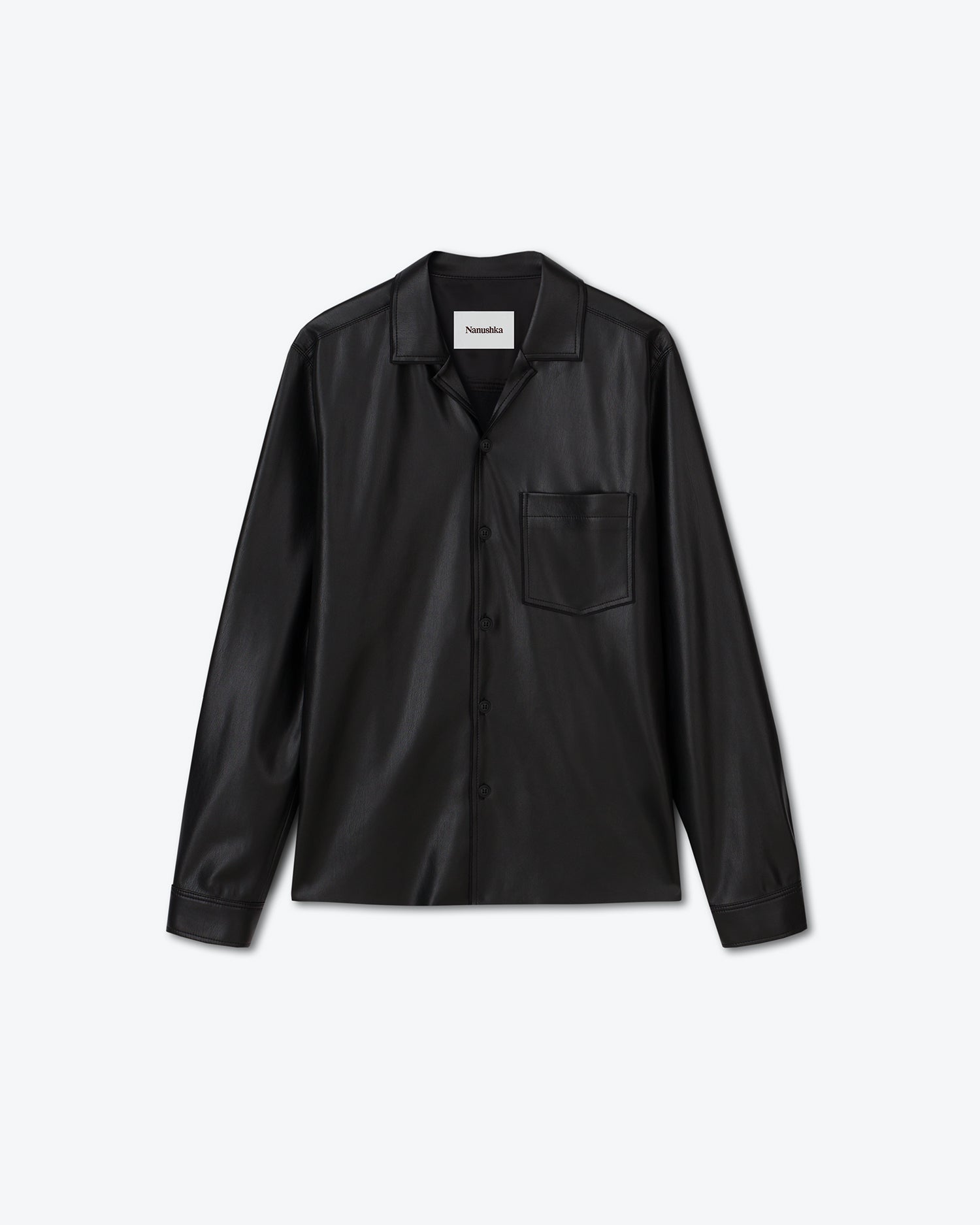
DUCO SHIRT
Welcome to your Duco Shirt.
Visit this page anytime throughout your ownership of this piece to connect to Nanushka’s world. Here, you’ll find everything from styling insights and information about transparency and circularity, to resale and rental instructions once your time with your item has come to an end.
Sustainability is a driving force at Nanushka. We’ve long been fascinated by the interaction between the natural world and human existence within it, of the balancing and transformative effects of spending time in nature. At their heart, our collections are not only inspired by the natural world, but work with it powerfully through design cues and conscious craftsmanship.
We look at every project and design through the lens of sustainability and are constantly working on improving it. The preferred fibers and materials of our collections is increasing from season to season. We plan to make every item from responsibly sourced materials by 2025. If you want to learn more about our progresses visit our page here.

Sustainability is a driving force at Nanushka. We’ve long been fascinated by the interaction between the natural world and human existence within it, of the balancing and transformative effects of spending time in nature. At their heart, our collections are not only inspired by the natural world, but work with it powerfully through design cues and conscious craftsmanship.

THE STORY OF YOUR ITEM
This item is part of our Core collection, a permanent collection of timeless yet modern pieces that consistently exemplify the Nanushka design philosophy. An artful reevaluation of the codes and cues that matter most to us - comfort, functionality and conscious craftsmanship - the collection moves beyond the traditional notion of basics to present a new timeless wardrobe dynamic.
OKOBOR™
OKOBOR™ is an exclusive fabric developed by Nanushka, free from the use of animal skin and derivatives.
This fabric is made with a 56% recycled polyester and 44% polyurethane. Recycled polyester is a more environmentally friendly choice than virgin polyester as it reduces both the demand put upon natural resources and the impacts generated by the extraction of non-renewable fossil fuels. Preventing waste from ending up in landfills, recycled materials also contribute to a circular economy.
Polyester is a synthetic fiber that comes from fossil fuels, a non-renewable resource that is extracted from the earth. The production of these fibers is a high-impact process, requiring chemicals and energy, as well as generating high greenhouse gases emissions. If any waste water is not treated properly, hazardous chemicals can be released into the environment. Switching to recycled polyester reduces the need for virgin resource extraction; reduce water, chemical, energy consumption; and lessens GHG emissions.
Most recycled polyester comes from recycled plastic bottles, which are mechanically recycled into chips, melted and extruded to create a yarn that is then knitted or woven into textiles. Even though recycled polyester from plastic waste lessens GHG emissions and reduces natural resources consumption, it has its limitations; in fact it can't be recycled mechanically a second or multiple times as the quality of the fibers gets weaker. Our objective is to support a transition to textile-to-textile recycling via chemical recycling, as to reduce the amount of waste ending up in landfill and preserve the quality of the fiber.
The other growing concern of polyester/recycled polyester fabrics is microfibers shedding, which is the release of fibrous microplastics in marine habitats. To support the reduction of microplastic shedding, we encourage the following actions:
1. Wash Less.
2. Use a colder washing cycle.
3. Use a washing bag to capture microfibers from ending up in water streams, and also to preserve the quality of your clothes.
4. Install a microfiber filter in your washing machine.
- Post Consumer Plastic Waste Selection
- Shredding into flakes
- Pellet chips are Melt and Spin into Yarn
- Fabric Weaving & Knitting
- Fabric Processing: Dyeing, Printing, Finishing
- The Material is Ready
The Journey of your item
- TIER 4 China
Raw material production and/or extraction - TIER 3 China
Raw material processing - TIER 2 China
Fabric production - TIER 1 Hungary
Garment manufacturing

CIRCULARITY AT NANUSHKA
“We believe in the vision of a circular economy and we recognise our responsibility as a brand to proactively take steps towards building a circular fashion system where products and materials are utilised to their fullest. Through an increased level of transparency, we’re constantly looking to shape a better future of consumption and production.”
- Sandra Sandor, Founder and Creative Director, Nanushka
Find out more about how you can join us in contributing to the circular economy below.
Repair
We provide a 6-month repair warranty on all items and our repair service is available also beyond this period at all of the Nanushka store locations.
If you’re not able to visit one of our stores, email customercare@nanushka.com.
Resale & Rental
If you no longer wear your item, consign it to any of The RealReal stores or consignment offices and get a 100 USD off from your next purchase at Nanushka. Terms & Conditions apply.
FIND OUT MORE ON HOW TO EXTEND THE LIFE OF YOUR GARMENT
EUROPE
Lend your item at Hurr (UK) or Wardrobe (worldwide).
Resell your item at Vestiaire Collective (worldwide).
AMERICAS
Lend your item at Villageluxe (US) or Wardrobe (worldwide).
Resell your item at TheRealReal (US) or Vestiaire Collective (worldwide).
AUSTRALIA
Lend your item at The Volte (Australia) or Wardrobe (worldwide).
Resell your item at Vestiaire Collective (worldwide).
ASIA
Lend your item at YCloset (China) or Wardrobe (worldwide).
Resell your item at Zhi Er, Secoo (both in China), Reebonz (Asia-Pacific) or Vestiaire Collective (worldwide).

garment care
Follow the care instructions below to get the most out of your piece.
Join us in revolutionising laundry practices by checking out clevercare to learn how to reduce climate impact while caring for your favourite Nanushka items.
Do not wash.
Professional dry clean only.
Do not bleach.
To maintain the quality of your item, do not use any bleach.
Look out for the symbol on the care label to know what type of bleach - if any - you can use on your garments.
To avoid shrinking, do not tumble dry.
By hang drying your laundry soon after washing, you can save energy, minimize creasing and your clothes will stay in shape and last longer.
Do not iron.
Gentle dry clean any solvent, except Trichloroethylene.
Make sure you keep the care label on the garment, so the dry cleaner will know how to better care for it.
Ask your dry cleaner how they contribute to sustainability and environmental protection.
